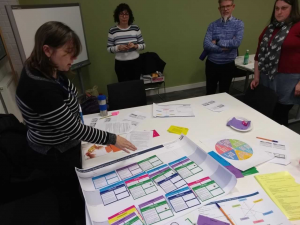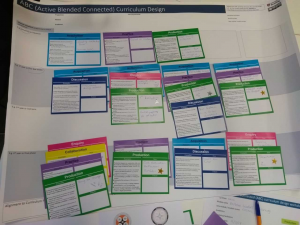Caroline Crolla, Student Success and Engagement Team, Student Services c.s.crolla@reading.ac.uk
Overview
Peer Assisted Learning (PAL) is a globally recognised scheme where more experienced students who have already successfully completed a module work with students who are studying the module for the first time. One hour, weekly PAL sessions are run by trained and experienced student PAL Leaders, who are regularly debriefed by programme academics, and supported by a PAL Coordinator. Students who attend PAL sessions seem to do better than those who do not.
Objectives
HEIs with experience of PAL have found that the scheme contributes to improved retention, engagement and performance through shared learning, engendering stronger links between academics and students as well as providing an additional form of in-module feedback.
The principles underpinning Peer Assisted Learning include:
- the PAL scheme should target high risk modules, not high risk students
- student participation should be voluntary
- student PAL Leaders are facilitators and not quasi-lecturers
Context
Peer Assisted Learning (PAL) was first introduced at the University of Reading in 2015-16 in a few departments as pilot schemes. Early adopters were academics teaching modules in Art, Economics, Mathematics, Creative Writing and Speech & Language Therapy.
The provision of Peer Assisted Learning is now in its fourth year at the University of Reading. In both the autumn and spring terms, there are PAL sessions supporting specific modules in an ever-growing number of subjects: Agriculture, Biosciences, Classics, Clinical Language Sciences, Economics, Language & Literature, Food Nutritional Sciences, Law, Mathematics and Statistics, Pharmacy and Psychology.
Implementation
Peer Assisted Learning sessions work best in modules that are recognised as cognitively challenging, where student results are low and where student module feedback is less positive.
To implement PAL sessions, module convenors or lecturers select modules in which students would benefit from the offer of PAL sessions and contacting the PAL Coordinator (pal@reading.ac.uk or c.s.crolla@reading.ac.uk). The PAL Coordinator helps with recruitment, taster sessions, promotion and providing high-quality training. The compulsory, two-day PAL Leader training takes place before the autumn modules start, and again in January before the spring term modules start. So academics contact the PAL Coordinator to agree PAL publicity, interviews, selection and recruitment of Leaders, ideally a term before the module runs.
The role of PAL Leader is voluntary. PAL Leaders can be recruited if they have successfully completed the module that PAL sessions are supporting. The module convenor has the final say about the selection of PAL Leaders. PAL Leadership develops students’ facilitation and coaching skills, communication and organisational skills and the role shows employers that students have gone above and beyond their degree. PAL Leadership is included on students’ degree transcripts and counts for the RED Award. PAL Leaders help with problem solving, study skills, exam techniques and coursework. PAL Leaders know that they do not teach, re-teach nor give answers and make this clear to their PAL participants. PAL Leaders will have regular support from the module convenor / academic contact.
Impact
Quantitative data
We collect PAL session attendance data which is then matched against module results. In 2017-18 we had a significant amount of data, which showed that there seemed to be a positive correlation between attendance at PAL sessions and higher average results. Accepting that attendance at PAL is voluntary and students going to PAL may already have positive study habits, in Pharmacy, Economics and Maths modules results show that on average those students who attend 4 or more PAL sessions achieve higher results than those students who do not.
Qualitative data
We also collect PAL Leaders’ and PAL participants’ views about the impact of PAL on their understanding of their work. Participants answered the following free text questions: 1) What did you gain from attending PAL sessions and 2) How could PAL be improved to meet your academic needs better? Key benefits were perceived to be: an increase of understanding and an increase of confidence; the benefits of collaborating with peers; appreciating the “real world” connections better in terms of the value of placements or coursework and the benefits of learning and thinking collaboratively.
- I’ve gained more knowledge regarding the module & find it easier to ask for help.
- Good to have opportunity to interact with students in the year above.
- A more interactive way of working, more group work, some sharing of 4th year placement and usefulness of this module for next year
PAL leaders reported that they had developed their organisational and leadership skills; they understood facilitation of learning better and were clearer about how students can be encouraged to learn better. Team work skills were also mentioned as was the value of consolidating and reviewing one’s own learning as leader because of reviewing materials with their participants.
- I learnt a lot about organising my time and coming up with creative ways to engage with content
- I learnt about different ways to make group activities fun. I also learnt the value of having structured tasks i.e. snowballing, as opposed to simply asking a question and hoping that someone would answer!
- Being a PAL leader also helped me to consolidate my learning of the module, whilst developing methods to effectively communicate this learning to students in lower years.
Reflections
As the PAL scheme has developed at the University of Reading over the past three years, all three groups involved in PAL, the PAL Leaders, the PAL participants and the PAL academics see PAL as a “win – win” scheme. As the scheme is voluntary, there are no significant costs to the subjects implementing PAL. The PAL Coordinator and Senior PAL Leaders, a paid role, take responsibility for the majority of the implementation of the scheme.
For more students to benefit from peer assisted learning sessions, four key issues need to be addressed: PAL sessions need to appear in students’ timetables; peer assisted learning needs to be clearly presented and understood, through PAL specific publicity and authentic Leader and participant voices explaining that the sessions are about collaborative learning and not remedial support; academics need to understand and support the principles of peer assisted learning and regularly endorse the scheme and review progress with the PAL leaders and the role of the Senior PAL Leader can be developed further.
If you are interested in adopting PAL in your module, please contact the PAL Coordinator, Caroline Crolla c.s.crolla@reading.ac.uk or pal@reading.ac.uk .
Link
The University of Reading is a member of the UK PASS (Peer Assisted Study Sessions) and European SI (Supplemental Instruction) peer-learning network with its centre at Lund University in Sweden https://www.si-pass.lu.se/en/about-si-pass/si-pass-around-the-world .
Articles
Boud ,D., Cohen, R. & Sampson, J. (1999) Peer Learning and Assessment, Assessment & Evaluation in Higher Education, 24:4, 413-426,
Capstick, S. (2004). Benefits and Shortcomings of Peer Assisted Learning (PAL) in Higher Education: an appraisal by students. In Peer Assisted Learning Conference.
Congos, D. H., & Schoeps, N. (1993). Does supplemental instruction really work and what is it anyway? Studies in Higher Education, 18(2), 165-176.
Smith, J., May, S., & Burke, L. (2007). Peer Assisted Learning: a case study into the value to student mentors and mentees. Practice and Evidence of the Scholarship of Teaching and Learning in Higher Education, 2(2), 80-109.


















